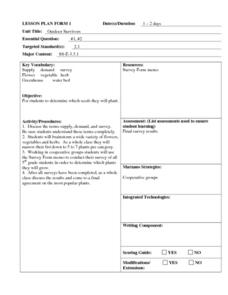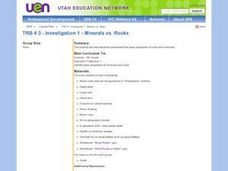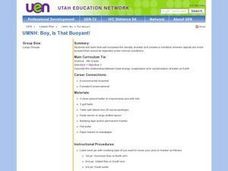Curated OER
'Water, Water Everywhere...'
Fourth graders explore how the Utah pioneers used irrigation to make the desert 'blossom as a rose'. They use geographical tools to analyze political and physical features of Utah, the United States, China, and Asia.
Curated OER
Outdoor Survivors
Fifth graders complete a survey to decide what are most popular plants among the class. They test the water quality in a nearby pond. Studnts test the quality of soil samples taken from their homes. Different plants are moistened with...
Curated OER
How Do You Dew?
Students examine how the processes of condensation and evaporation occur. They describe the relationship between heat energy, evaporation and condensation of water on Earth. They give examples of the processes of evaporation and...
Utah LessonPlans
The Mystery of the Sponge
Students observe that water has weight and that weight decreases as water evaporates. The changes that occur as a sponge dries on a yardstick balance illustrates this concept.
Curated OER
Nothing New? A Physical Change
Fifth graders discuss the differences between chemical and physical changes. In groups, they complete experiments and discover how a physical chnage can be reversed. To end the instructional activity, they review the steps of the water...
Curated OER
What is in Soil?
Fourth graders identify and examine the components that make up soil. Individually, they use a magnifying glass to identify the organic and inorganic material in their soil sample. To end the lesson, they record the differences in the...
Curated OER
Minerals vs. Rocks
Fourth graders are introduced to the characteristics of a variety of minerals and rocks. As a class, they are shown rocks and minerals and asked to describe them as a geologist would. They work together to measure and record their...
Curated OER
Interpersonal Communication
Learners identify and practice the skills necessary for effective communication including reading, listening, and non-verbal. They read aloud and discuss, "They Water Closet Story" to determine which characters did not adequately...
Curated OER
How Big Are Earth, Sun, and Moon?
Third graders draw what they believe is in space on a dry erase board. In groups, they are given a beaker half filled with water and they add a teaspoon of oil, observing the different layers that form. To end the lesson, they identify...
Curated OER
Mini-Ecosystems
Third graders identify the living and non living things in a book read aloud and discuss the interactions represented in the book. Then, they research and include a list of food that each animal needs in an ecosystem. Finally, 3rd...
Curated OER
Will it Float?
First graders discuss why some things sink and some float after dropping a variety of items into water.
Curated OER
Acid Rain
Students investigate the quality of water using a variety of methods. They use a pH probe to measure the pH and study the effect of dissolved CO2 in the water. Students also observe the effect of the pH upon the dissolving of H2SO4 in...
Curated OER
Space Exploration
Fourth graders observe an empty 14 oz. clear plastic cup and measure how much water the cup can hold when it is completely full. They work in groups to fill the plastic cup, but half of the groups receive a smaller vial and the other...
Curated OER
Influence of the World's Ocean Currents on the Carbon C
Students, in groups, observe how the salt content and temperature of water affects the ocean currents. They also read articles and dicuss.
Curated OER
Boy, Is That Buoyant!
Fourth graders see that salt increases the density of water and creates a condition wherein objects are more buoyant than would be expected under normal conditions. They describe the relationship between heat energy, evaporation and...
Curated OER
Xeriscaping In Your Community
Fourth graders participate in a service-learning project to design landscaping that maximizes water use and utilizes indigenous plant species.
Curated OER
Build A "Bug"
Students brainstorm different adaptations that bug would need to live in aquatic environment, and watch presentation where classmate is dressed up in costume to represent adaptations necessary for macroinvertebrate to survive in water.
Curated OER
Science: Discovering Earth's Air Prressure
Fourth graders discover earth's air pressure through observation of several experiments. In the "Experiment of the Leaky Bottle," they observe how air pressure forces water out of the lowest hole farther than the holes above it. In...
Curated OER
Vegetable Lab
Third graders prepare vegetables using common methods: au gratin, minimum water method, broiled, panfry, frozen, and stuffed. They share with the rest of the class and determine which methods preserve nutrients, color, flavor and texture.
Curated OER
Pen Pals
Young scholars make their own predictions about the amount of different types of birds at each site before they go there. In groups, they collect the bird data and compose letters to their pen pals sharing their information. To end the...
Curated OER
Gas Exchange And Respiratory Systems.
Explore structures within the realm of gas exchange in terrestrial and aquatic life. The excellent, labelled diagrams and clear descriptions help your students view the different structures and adaptations that have developed. The 29...
Curated OER
Sustainable Livestock
Students investigate healthy eating habits by researching livestock. In this food sustainability instructional activity, students research the negative impact factory farming has on our environment due to pollution. Students define...
Forest Foundation
The Sustainable Forest
As part of their examination of forest ecosystems, class members examine how foresters, biologists, botanists, geologists, and hydrologists work to together to develop a management plan for sustainable forests.
Curated OER
Solar Kit Lesson #7 - Positioning Solar Panels I: Explorations with Tracking
In this first part of a two-part lesson, learners track and record the sun's azimuth using a solar panel. They graph and analyze the data to identify relationships among the time of day, the altitude and azimuth of the sun, and the...

























